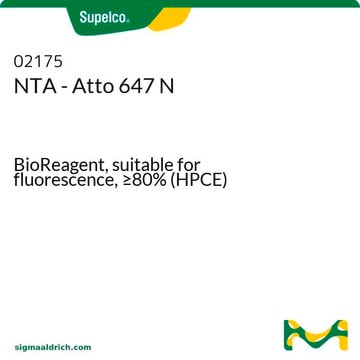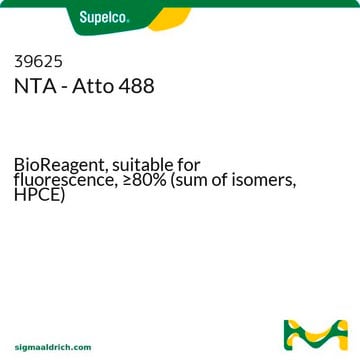04507
Atto 647N
BioReagent, suitable for fluorescence, ≥90.0% (HPLC)
Sign Into View Organizational & Contract Pricing
All Photos(1)
About This Item
Recommended Products
product line
BioReagent
Assay
≥90.0% (HPLC)
form
powder
manufacturer/tradename
ATTO-TEC GmbH
λ
in ethanol (with 0.1% trifluoroacetic acid)
UV absorption
λ: 640.0-646.0 nm Amax
suitability
suitable for fluorescence
detection method
fluorometric
storage temp.
−20°C
Application
Atto 647N is a superior red-emitting fluorescence dye with a strong absorption, excellent fluorescence quantum yield (65%), high photostability, excellent ozone resistance, good solubility, and very little triplet formation.
Legal Information
This product is for Research use only. In case of intended commercialization, please contact the IP-holder (ATTO-TEC GmbH, Germany) for licensing.
Storage Class Code
11 - Combustible Solids
WGK
WGK 3
Flash Point(F)
Not applicable
Flash Point(C)
Not applicable
Personal Protective Equipment
dust mask type N95 (US), Eyeshields, Gloves
Certificates of Analysis (COA)
Search for Certificates of Analysis (COA) by entering the products Lot/Batch Number. Lot and Batch Numbers can be found on a product’s label following the words ‘Lot’ or ‘Batch’.
Already Own This Product?
Find documentation for the products that you have recently purchased in the Document Library.
Customers Also Viewed
Chunxiang Chen et al.
Sensors (Basel, Switzerland), 12(9), 11684-11696 (2012-11-01)
A novel lateral flow immunoassay (LFIA) signal amplification strategy for the detection of Cry1Ab based on amplification via a polylysine (PL) chain and biotin-streptavidin system (BSAS) is described. In this system, multiple fluorescence dyes (FL) were directly coated on the
Mengjun Xue et al.
Langmuir : the ACS journal of surfaces and colloids, 28(50), 17578-17584 (2012-11-24)
Mesoporous silica nanoparticles show promise as a drug-carrier vehicle for biomedical applications, but the development of simple, biocompatible capping systems has remained a challenge. We have found that lysozyme molecules can act as a pH-responsive nanovalve to block and unlock
Single-molecule STED microscopy with photostable organic fluorophores.
Robert Kasper et al.
Small (Weinheim an der Bergstrasse, Germany), 6(13), 1379-1384 (2010-06-04)
Christian Eggeling et al.
Nature, 457(7233), 1159-1162 (2008-12-23)
Cholesterol-mediated lipid interactions are thought to have a functional role in many membrane-associated processes such as signalling events. Although several experiments indicate their existence, lipid nanodomains ('rafts') remain controversial owing to the lack of suitable detection techniques in living cells.
Yongdoo Choi et al.
Surgical endoscopy, 25(7), 2372-2377 (2011-02-08)
Accurate tumor localization is essential for gastrointestinal surgery, especially in cases of early cancer. This study was designed to develop a novel fluorescent clip for rapid and exact visualization of tumor sites. A transparent polymer matrix containing highly bright fluorochromes
Our team of scientists has experience in all areas of research including Life Science, Material Science, Chemical Synthesis, Chromatography, Analytical and many others.
Contact Technical Service



